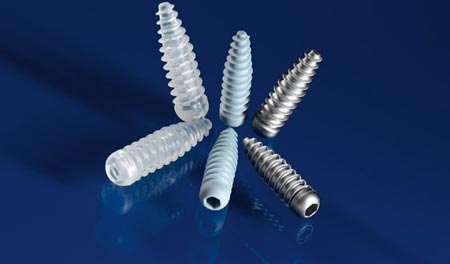Concerns over surgical procedures to heal athletes’ ligament injuries are alleviated by a new invention from scientists at the Fraunhofer Institute, Benmen, involving a biodegradable implant screw.
For football players, skiers, and tennis players, the greatest worry and fear is suffering an injury that leads to a torn anterior cruciate ligament (ACL) in the knee.
In such cases, they must undergo surgery to restore the stability of the joint. During the surgery, the torn or damaged ligament is replaced with a piece of ligament from another part of the leg, secured to the bone using titanium screws.
The issue with these screws, made of titanium, is that after a certain period, patients must endure another painful surgery to remove them.
Therefore, researchers from the Institute for Applied Materials Research and Production Engineering (IFAM) at the Fraunhofer Institute in Bremen have developed a new type of implant screw that is biologically compatible with the body and capable of self-degrading over time without being toxic to the body. The scientists aim to reduce the pain and recovery time for patients with ligament tears or other bone-related issues.
Dr. Philip Imgrund, head of the biomaterials technology department at IFAM, stated: “We have created a new bio-material that is biochemically strong yet capable of self-degradation. Depending on the conditions and composition, these biodegradable screws will degrade within approximately 24 months.”

The new biodegradable screw eliminates the need for patients to undergo a surgery for its removal.
These self-degrading screws are made from polylactic acid, a material commonly used in the medical field. However, previously, they had the drawback of potentially leaving holes in the bone as they degraded over time.
The IFAM research team has enhanced the material by developing a blend of polylactic acid and hydroxyapatite—a ceramic that is a primary component of bone. This new material for the screws has a higher hydroxyapatite content, promoting bone growth underneath the implant.
The new biodegradable screw has a rigidity nearly equivalent to that of natural bone. While normal bone can withstand compressive forces of 130-170 N/mm2, this screw boasts a rigidity of up to 130 N/mm2, representing a significant breakthrough.
To create this screw, the scientists do not grind the material but instead use a framing and compression method at 140 degrees Celsius. The traditional powder compaction process, however, must be conducted at extremely high temperatures, up to 1,400 degrees Celsius.
Looking ahead, engineers aim to continue developing similar types of biodegradable implants through the aforementioned energy-efficient processes.


















































